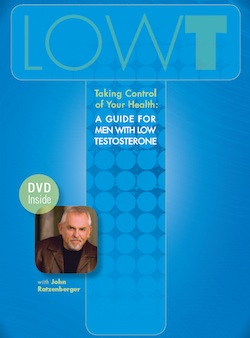The Marketing of Low T (“Low Testosterone”) Ghostwriting, Celebrities, Symptom Quizzes, NumbersClick Here for Additional Resources
 A conversation with Adriane Fugh-Berman, MD, Associate Professor at Georgetown University Medical Center and Director of PharmedOut (see Bio). We discuss how the marketing of Androgel uses ghostwriting, celebrities, symptom quizzes, and numbers to convince men and physicians that “low testosterone” is a medical condition that should be treated.
A conversation with Adriane Fugh-Berman, MD, Associate Professor at Georgetown University Medical Center and Director of PharmedOut (see Bio). We discuss how the marketing of Androgel uses ghostwriting, celebrities, symptom quizzes, and numbers to convince men and physicians that “low testosterone” is a medical condition that should be treated.
Aired LIVE on:
Thursday, April 25, 2013
You also can visit this Pharma Marketing Talk Segment Page and listen to the archived audio podcast. This show and ALL Pharma Marketing Talk shows are available as podcasts via PMT on iTunes (FREE!).
BackgroundMM&M’s “All-Star Marketing Team of the Year” (2012) was Androgel marketed by AbbVie — Abbott Laboratories’s recently spun-off independent biopharmaceutical company — and its agencies, which include Digitas Health for consumer ads and AbelsonTaylor for professional ads.
Androgel is a treatment for “low testosterone”; i.e., Primary hypogonadism and Hypogonadotropic hypogonadism. Or, as marketers like to call it, “Low T,” which is much less scary than “Hypogonadotropic hypogonadism”.
 Low T drug sales in the U.S. reached nearly $2 Billion a year (ending October 2012) and the $1.37 Bn in sales of Androgel represent about 70% of that total. In fact, Androgel sales increased 19% over that period thanks no doubt to direct-to-consumer (DTC) marketing coupled with physician marketing.
Low T drug sales in the U.S. reached nearly $2 Billion a year (ending October 2012) and the $1.37 Bn in sales of Androgel represent about 70% of that total. In fact, Androgel sales increased 19% over that period thanks no doubt to direct-to-consumer (DTC) marketing coupled with physician marketing.
One of the marketing “initiatives” that MM&M highlighted was the “Drive for Five” campaign, which urges men to know their testosterone (T) levels, in addition to lipid, BP, blood sugar and PSA numbers. On the website (http://www.driveforfive.com; “Mens Health | Learn about 5 risks to mens health”) is an animated “gear box” that shifts from high cholesterol (first gear) to high blood pressure (second gear) to high blood sugar (third gear) to high PSA (four gear) and, finally, to low testosterone (fifth gear).
The Androgel marketing campaign doesn’t only include ads. It also includes patient literature, celebrities such as John Ratzenberger (played Cliff Clavin in the TV sitcom Cheers), symptom quizzes, and ghost-writers, all aiming to convince men and their doctors that an epidemic of low T has begun. “Self-administered tests for the syndrome are widely available online,” says Dr. Fugh-Berman, “and the bar for failure is low.”
Questions/Topics Discussed- Tell us a little bit about PharmedOut and the “Medical Behavior in a Commercial World: Who is Responsible?” conference.
- How does the marketing of Androgel and other testosterone gels and patches use ghostwriting, celebrities, symptom quizzes, and numbers to convince men and physicians that “low testosterone” is a medical condition that should be treated?
- Do you see this as a problem akin to “disease mongering?” What’s the harm in making more men aware of “low testosterone” and urging them to treat it?
- Are the same tactics used for other products?
- How do direct-to-consumer (DTC) ads for these products differ from professional ads aimed at physicians?
Guest Bio
 Adriane Fugh-Berman, MD is an internationally known expert in pharmaceutical marketing techniques who heads PharmedOut, a Georgetown University-based research and education project that examines and exposes the effect of pharmaceutical marketing on prescribing practices. Dr. Fugh-Berman leads a team that has had a profound impact on physician awareness of adverse consequences of industry marketing.
Adriane Fugh-Berman, MD is an internationally known expert in pharmaceutical marketing techniques who heads PharmedOut, a Georgetown University-based research and education project that examines and exposes the effect of pharmaceutical marketing on prescribing practices. Dr. Fugh-Berman leads a team that has had a profound impact on physician awareness of adverse consequences of industry marketing.
An expert on botanical medicine and dietary supplements, Dr. Fugh-Berman is Associate Professor in the Department of Pharmacology and Physiology and in the Department of Family Medicine at Georgetown University Medical Center. Dr. Fugh-Berman also consults for various federal and state agencies regarding the risks and benefits of dietary supplements, including the NIH National Center for Complementary and Alternative Medicine, and the Federal Trade Commission.
Dr. Fugh-Berman graduated from Georgetown University School of Medicine and completed a family medicine internship in the Residency Program in Social Medicine at Montefiore Hospital in the Bronx.
Additional Resources









![6 Digital Tools at the Center of Healthcare Digitalization [INFOGRAPHIC]](http://ec2-54-175-84-28.compute-1.amazonaws.com/pharma-mkting.com/wp-content/uploads/2021/04/6DigitalTools_600px-100x70.jpg)




